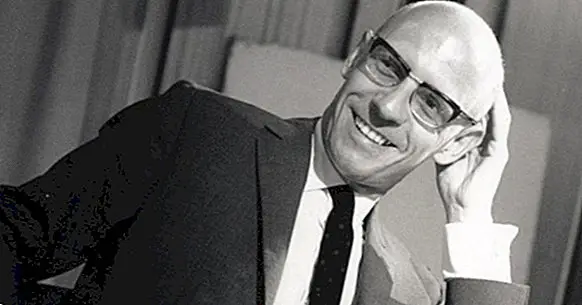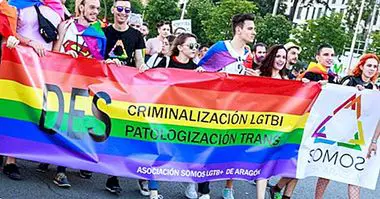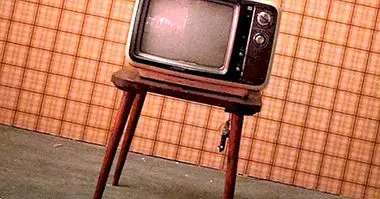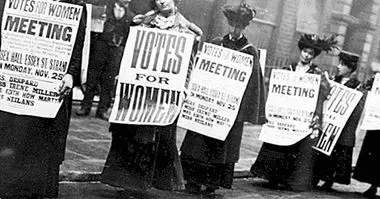Biopower: a concept developed by Michel Foucault
Michel Foucault coined the concept biopolítica, or biopower , in the last section of the first volume of his History of Sexuality, 1976. In this section, called "right to death or power over life", he explains how in the last two centuries a step has been taken in the form of to exert power on the part of the States: previously the power was based on the capacity of the sovereign to give death, now it is based on the capacity to manage life.
So, it is a power that not only threatens to dispossess property and ultimately life, but also control life , to make it grow, organize it and optimize it.
The biopolitics according to Foucault
The ancient form of power had in the beyond, in death, a metaphysical justification of its earthly power. Biopower has its limit in death.
This is shown, for example, in totalitarian regimes , that mobilize whole populations to make war with the pretext of preserving the life of the group, whereas before people went to war they did it to maintain the political power of the lord or the sovereign.
The two forms of biopower
For Foucault, several advances in technology that culminated just before the French Revolution allowed lengthening and improving life while controlling it better. A) Yes, the biopower began to be exercised in two different ways but connected to each other: the disciplines of the body and the controls of the population.
Disciplines of the body
The disciplines of the body arise in the mid-seventeenth century, and focus on making strong and useful an individual body understood as a machine. It is exercised by institutions such as education or the army, but also anatomy. They are systems in charge of mold the individual to integrate it into society and turn it into a useful element.
Thus, the educational system, for example, in addition to imparting a series of knowledge are responsible for generating a series of habits and bodily attitudes, in the same way as the army.
Population controls
In the middle of the 18th century, the population controls emerged. While the disciplines of the body focus on the individual, population controls focus on the species. The bodies are studied as supports for collective biological processes. These are disciplines such as statistics, and previously unknown problems of birth control, mortality, longevity or the health level of the population. We see how these are ways of exercising power that do not seek death, but manage life.
Thus, it happens to conceive the governed as subjects of right to conceive them as living beings . This has the consequence that while the old form of power contemplates human existence as a legal entity, biopower considers it as biological. A) Yes, the power is no longer based exclusively on the law . Although the law continues to exist, this is one more element in an array of institutions (the family, the education system, the army, medicine, etc.) that seeks to govern by regulating what is normal and adapting to it. to all individuals in society.
Biopower also becomes a new framework for sciences, which under this new paradigm stand as part of the network of institutions that exercise biopower.
Opposition to power
Faced with this, the opposition to power is based, according to Foucault, on the same biopolitical conception, since such opposition demands the possibility of living a full life, something previously unthinkable. Thus, the ideology of biopower reaches even the resistance to power .
Our own conception of sex would be biopolitical. Precisely it is sex, that unnamable sphere, which seems free from all political interference, where biopower manifests itself implacably.
Thus, common sexual practices, but also scientific conceptions about sex, would be a way to shore up the balance of power of the status quo through sexual practice. We see here as for Foucault the systems of knowledge generate what they try to describe, so that in their essence they are mechanisms of power.
The biopower after Foucault
Biopolitics has become, after Foucault, in all an academic discipline within fields such as political philosophy , the philosophy of nature, sociology or political science.
Indeed, the critical framework created by Foucault has become more and more useful as technology penetrates more and more into biological structures to modify them, both at the molecular and anthropological levels, with the emergence of cyborgs and transhumanism , generating a multitude of ethical and political problems.On the other hand, the transgression of the boundary between technology and nature is central in issues such as climate change.
Today the experts could be divided into two groups. On the one hand there are those who believe that any biological notion and every conception of nature is an instance of biopower, so that all politics would be within the framework of biopolitics. Thus, there would be a nature to protect but a biopolitical to modify.
On the other hand, would be those who believe in a kind of positive biopolitics . Following a note by Foucault himself on History of sexuality, this group believes that there is always something of nature that escapes biopower, for example in the most irrational and intimate life impulses of the human being, or in the element of randomness present in the operation of nature, which would occasionally escape the biopolitical control mechanisms. For this group, the objective is to keep nature aside from biopower, denouncing biopolitical excesses.
Bibliographic references:
- Foucault, M. (2007). History of sexuality. 1st ed. Mexico, D.F .: Siglo XXI Editores.
- Nilsson, J. and Wallenstein, S. (2013). Foucault, biopolitics, and governmentality. 1st ed. Huddinge: Södertörns högskola.



















